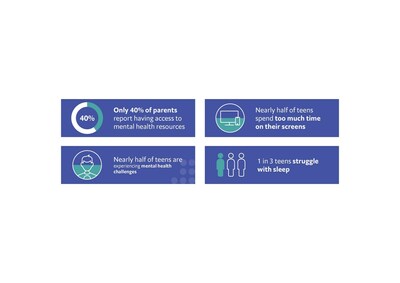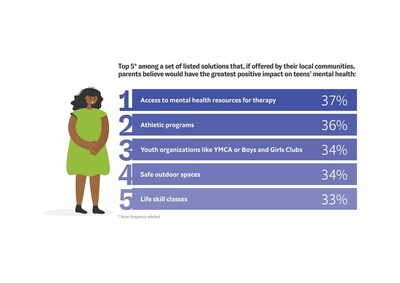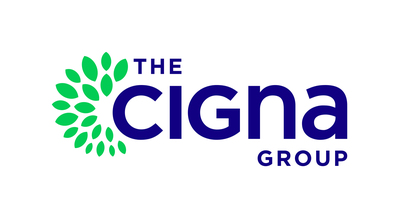|
09.10.2023 13:00:00
|
New Report Urges Collaborative, Community Approach to Combat the U.S. Mental Health Crisis
BLOOMFIELD, Conn., Oct. 9, 2023 /PRNewswire/ -- American families are struggling to overcome mental health issues exacerbated by the pandemic as parents need more support from employers and communities to help them do so, according to a report from The Cigna Group. Nearly half of parents surveyed said their teenagers were experiencing mental health challenges and one third of parents said their teens struggle with sleep. As a result, more than 25% of parents said their own mental health was negatively impacted and report feeling overwhelmed by their child's emotional challenges.
"While awareness has grown, barriers to getting mental health care remain for many families – chief among them are knowing where to turn for support and finding the right provider. As conditions like depression, anxiety, and addiction become more pervasive, we need to think differently about how we break down barriers once and for all," said David M. Cordani, chairman and CEO, The Cigna Group. "To curb this crisis and safeguard America's future, we need to work together to equip and empower communities with the support they need to revitalize social connections, strengthen resiliency, and improve health and vitality."
Connecting communities, confronting health inequitiesU.S. Youth Mental Health Crisis Demands a Community Response is based on Economist Impact research commissioned by The Cigna Group. It shows parents face multiple barriers to supporting family mental health needs including:
- Not knowing the type of help needed (50%)
- Difficulty finding a trusted provider (46%)
- Lack of information about community resources (43%)
- Lack of support from schools (43%)
Nearly half of parents also identified cost of care as a barrier, and children who reside in lower socio-economic households are less likely than those in higher socio-economic households to receive treatment from a mental health provider. Many of the associated social determinants of health, such as safe housing, reliable transportation, parental educational attainment, and job status are considered non-modifiable, and thus communities, employers, and schools are critical for closing gaps in access to mental health treatment.
To help combat barriers, The Cigna Group Foundation has invested more than $10.5 million in community mental health organizations through the Healthier Kids For Our Future initiative over the last five years.
Activating private sector employers to advance health and well-beingEmployers provide health insurance for 159 million people or 59% of those under the age of 65 – more people in the U.S. than all other forms of coverage. They experience the effects of the mental health crisis every day due to the direct and indirect costs that impact workforce health and productivity. Employers are increasingly looking for innovative approaches to support the health and vitality of employees and their families, optimize productivity, and mitigate unnecessary costs.
Four in 10 parents reported a lack of business investment in mental health resources, such as wellness programs and mental health coaching, indicating they may be unaware of existing resources or need types of support not currently available. For example, parents rated community engagement as important as traditional mental health therapy, and many employers could do more to facilitate opportunities for employees and families to do so.
"Employers are experiencing the effects of the mental health crisis, as employees strive to deliver at work while also managing family mental health needs," said Cordani. "Given that Gen Z will make up one third of our country's workforce by 2030, we need to do more to secure youth mental health. To do that, we need to view mental health as a collective responsibility between individuals, families, businesses, and community organizations – and work together to help people of all ages thrive."
Read Economist Impact's latest research, commissioned by The Cigna Group: U.S. Youth Mental Health Crisis Demands a Community Response.
About The Cigna GroupThe Cigna Group (NYSE: CI) is a global health company committed to creating a better future built on the vitality of every individual and every community. We relentlessly challenge ourselves to partner and innovate solutions for better health. The Cigna Group includes products and services marketed under Cigna Healthcare, Evernorth Health Services or its subsidiaries. The Cigna Group maintains sales capabilities in more than 30 countries and jurisdictions, and has more than 165 million customer relationships around the world. Learn more at thecignagroup.com.
Media ContactJustine Sessions
media@thecignagroup.com
![]() View original content to download multimedia:https://www.prnewswire.com/news-releases/new-report-urges-collaborative-community-approach-to-combat-the-us-mental-health-crisis-301950344.html
View original content to download multimedia:https://www.prnewswire.com/news-releases/new-report-urges-collaborative-community-approach-to-combat-the-us-mental-health-crisis-301950344.html
SOURCE The Cigna Group
 Der finanzen.at Ratgeber für Aktien!
Der finanzen.at Ratgeber für Aktien!
Wenn Sie mehr über das Thema Aktien erfahren wollen, finden Sie in unserem Ratgeber viele interessante Artikel dazu!
Jetzt informieren!
Nachrichten zu The Cigna Group Registered Shsmehr Nachrichten
|
04.02.25 |
S&P 500-Wert The Cigna Group Registered-Aktie: So viel Gewinn hätte eine The Cigna Group Registered-Investition von vor 3 Jahren eingebracht (finanzen.at) | |
|
30.01.25 |
S&P 500 aktuell: S&P 500 verbucht schlussendlich Zuschläge (finanzen.at) | |
|
30.01.25 |
Starker Wochentag in New York: S&P 500 nachmittags in der Gewinnzone (finanzen.at) | |
|
30.01.25 |
NYSE-Handel: S&P 500 am Donnerstagmittag im Plus (finanzen.at) | |
|
29.01.25 |
Ausblick: The Cigna Group Registered legt Zahlen zum jüngsten Quartal vor (finanzen.net) | |
|
28.01.25 |
S&P 500-Titel The Cigna Group Registered-Aktie: So viel Gewinn hätte ein Investment in The Cigna Group Registered von vor einem Jahr abgeworfen (finanzen.at) | |
|
21.01.25 |
S&P 500-Papier The Cigna Group Registered-Aktie: So viel Gewinn hätte ein The Cigna Group Registered-Investment von vor 10 Jahren eingefahren (finanzen.at) | |
|
15.01.25 |
Gute Stimmung in New York: S&P 500-Anleger greifen zum Start des Mittwochshandels zu (finanzen.at) |
Analysen zu The Cigna Group Registered Shsmehr Analysen
Aktien in diesem Artikel
| The Cigna Group Registered Shs | 276,80 | -0,31% |
|


